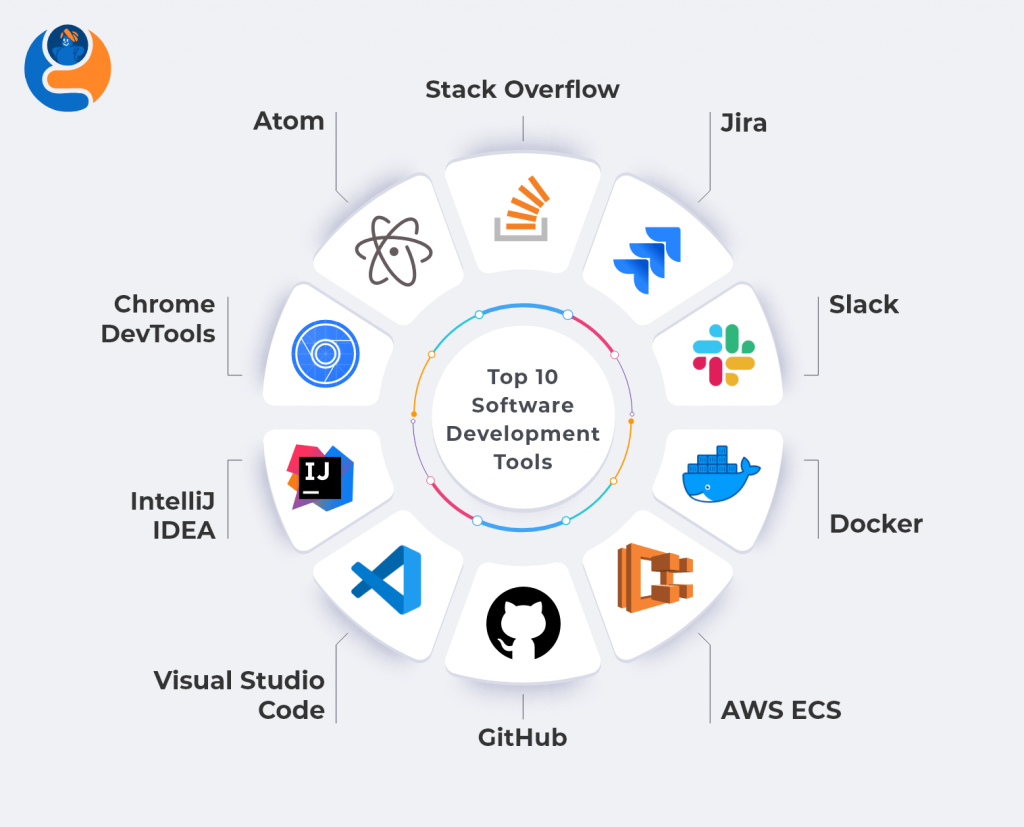Do you want to know what the number one software development tool is? Well, look no further because we have the answer for you. In this article, we will reveal the ultimate tool that professionals in the software development industry swear by. Whether you’re a beginner looking to enter this field or an experienced developer looking to level up your skills, this tool is a must-have in your arsenal. So keep reading to find out what it is and why it’s considered the best among all the options out there.

This image is property of www.softwaretestinghelp.com.
Understanding the Importance of Software Development Tools
Software development tools play a crucial role in the process of designing, building, and maintaining software applications. These tools are specially designed to assist developers in various tasks, facilitating the development and delivery of high-quality software. By using these tools, developers can streamline their workflow, enhance collaboration, and ensure efficient and effective software development.
Why are software development tools important?
Software development tools are important for several reasons. First and foremost, these tools help automate repetitive tasks, saving time and effort for developers. By automating routine processes such as code compilation, testing, and deployment, software development tools allow developers to focus more on the creative and problem-solving aspects of their work.
Furthermore, software development tools provide developers with the necessary features and functionalities to write clean, maintainable, and efficient code. These tools often include features like code completion, syntax highlighting, and debugging capabilities, which help developers write error-free code and identify and fix issues quickly.
Additionally, software development tools promote collaboration among team members by providing a centralized platform for code sharing, version control, and project management. These tools enable seamless teamwork, allowing developers to work together on the same codebase and track changes made by different team members.
Benefits of using software development tools
Using software development tools provides several benefits that contribute to the success of software projects. Firstly, these tools enhance productivity by automating repetitive tasks and providing features that expedite development processes. This increased productivity allows developers to deliver software applications faster, meeting project deadlines and reducing time-to-market.
Moreover, software development tools improve code quality and maintainability. With features like code analysis and refactoring capabilities, these tools help identify and correct errors, enhancing the overall reliability and stability of the software. In addition, these tools enable developers to easily navigate and understand complex codebases, simplifying maintenance and reducing the risk of introducing new bugs.
Furthermore, software development tools enhance collaboration and communication among team members. By providing shared repositories, issue tracking systems, and project management features, these tools foster effective teamwork. They enable developers to work together, share code, track changes, and communicate efficiently, resulting in improved coordination and faster development cycles.
Factors to consider when choosing software development tools
When choosing software development tools, it is essential to consider several factors. Firstly, the compatibility of the tool with the programming language and technology stack used in the project is crucial. Different tools are optimized for specific programming languages or frameworks, so it is important to select a tool that aligns with the project’s requirements.
Furthermore, it is important to consider the scalability and extensibility of the tool. As software projects evolve and grow, the tool should be able to accommodate the increasing complexity and size of the codebase. Additionally, the tool should support integrations with other tools and services, such as version control systems and project management platforms, to ensure seamless collaboration and workflow integration.
Another critical factor to consider is the learning curve of the tool. Developers need to invest time and effort to learn and adapt to new tools, so it is important to choose a tool that has a user-friendly interface, comprehensive documentation, and a supportive community. Additionally, considering the cost of the tool and the available support and updates is important to make an informed decision.
Overall, selecting the right software development tools plays a crucial role in the success of software projects. By considering factors like compatibility, scalability, learning curve, and cost, developers can choose the tools that best suit their needs and enhance their software development process.
Different Types of Software Development Tools
Software development encompasses a wide range of tasks and processes, and consequently, there are various types of software development tools available. These tools cater to different aspects of software development, ranging from coding and version control to project management and collaboration. Exploring each type of software development tool can help developers understand their functionalities and choose the ones that best suit their specific needs.
Coding and Integrated Development Environments (IDEs)
Coding and Integrated Development Environments (IDEs) are tools specifically designed to assist developers in writing, editing, and debugging code. These tools provide a comprehensive set of features and functionalities that expedite the coding process and ensure the production of clean and error-free code.
IDEs often include features like code completion, which suggests code snippets as developers type, saving time and reducing typing errors. They also provide syntax highlighting, which visually distinguishes different parts of the code, making it easier for developers to spot mistakes and identify the structure of the code.
Furthermore, IDEs offer debugging capabilities, allowing developers to identify and fix issues in their code by setting breakpoints, inspecting variables, and stepping through code execution. This feature is crucial for troubleshooting and resolving bugs efficiently.
Some popular examples of coding and IDE tools include Visual Studio Code, IntelliJ IDEA, Eclipse, and Xcode. These tools support various programming languages and frameworks, making them versatile options for developers.
Version Control Systems (VCS)
Version Control Systems (VCS) are essential tools in software development that allow developers to track changes made to the source code and collaborate effectively on a project. These systems provide a centralized repository where developers can manage and version their code, ensuring proper versioning, branching, and merging.
VCS enables developers to keep track of changes made to the codebase, including who made the changes, when they were made, and what specific modifications were implemented. This information is crucial for collaboration, as it allows developers to understand the evolution of the codebase and revert to previous versions if necessary.
There are two main types of VCS: centralized and distributed. Centralized VCS, such as Apache Subversion (SVN), uses a single, centralized repository, while distributed VCS, such as Git, creates local repositories on each developer’s machine, enabling independent work and offline access.
Git is the most popular VCS, widely used in software development projects due to its flexibility, scalability, and extensive community support. Other popular VCS tools include Mercurial and Perforce.

This image is property of blog.webcodegenie.com.
